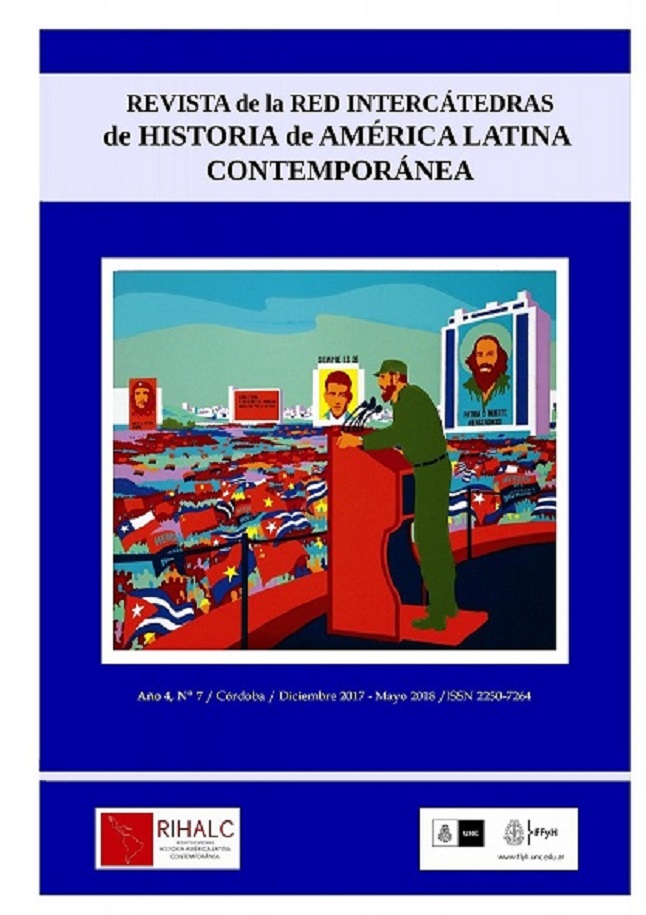The wind of the Cold War blows over the Americas: The Cuba- USSR relationships seen by the Brazilian diplomacy (1959-1962)
Keywords:
Cuban Revolution, Cold War, Organization of American States (OAS)Abstract
This article discusses how the Cuban Revolution significantly altered the relations among the countries in the American continent. For the Kennedy government, Fidel Castro represented the greatest intimidation to his hegemonic domination in the Americas. In a period of less than two years, there were many disputes between the United States of America and the Republic of Cuba. Some of them were treated with diplomacy level, but others, were treated through the use of military force. Brazil did not go beyond these disputes. According to its Política Externa Independente, the Goulart government was involved in the Cuba issue. Even in the midst of the emergence of a new Council of Ministers and concerned about the elections that would happen, the Brazilian government was paying attention to that small island in the Caribbean and to the actions of the US government. One of them, in particular, was the object of great interest by President João Goulart and Prime Minister Hermes Lima: the meeting of Secretary of State Dean Rusk with representatives of the Latin American countries at the Organization of American States (OAS).
Downloads
References
Almeida, Alberto Carlos (1998): Presidencialismo, parlamentarismo e crise política no Brasil, EDUFF, Niterói.
Bemvindo, Vitor (2009): Os impactos da revolução cubana na política externa brasileira (1958-1961). (Dissertação de mestrado não publicada). Programa de Pós-Graduação em História, Instituto de Filosofia e Ciências Humanas, Universidade do Estado do Rio de Janeiro, Rio de Janeiro.
Biazetto, Bruno Henz (2008): A insurreição no meu quintal: processo decisório e percepção da diplomacia norte-americana durante a Revolução Cubana (1958-1960). (Dissertação de mestrado não publicada). Programa de Pós-Graduação em História, Faculdade de Filosofia e Ciências Humanas, Pontifícia Universidade Católica do Rio Grande do Sul, Porto Alegre.
Castro, Fidel (2009): A História me absolverá. In: ALI, Tariq. Fidel Castro: as Declarações de Havana, Zahar, Rio de Janeiro.
Diez Acosta, Tomás (2002): Octubre de 1962: a um paso del Holocausto ¬– uma mirada cubana a la crisis de lós misiles, Editora Política, Havana.
Dobbs, Michael (2009): Um minuto para a meia-noite. Kennedy, Kruschev e Castro à beira da guerra nuclear, Rocco, Rio de Janeiro.
Domingos (2010): O Brasil e a URSS na Guerra Fria: a Política Externa Independente na imprensa gaúcha, Letra & Vida, Porto Alegre.
Gott, Richard (2006): Cuba: uma nova História, Zahar, Rio de Janeiro.
Hersh, Seymour (1998): O lado negro de Camelot, L&PM, Porto Alegre.
Hobsbswm, Eric (2003): Era dos Extremos – O breve século XX (1914-1991), Companhia das Letras, São Paulo.
Kempe, Frederic (2013): Berlim, 1961: Kennedy, Khruschóv e o lugar mais perigoso do mundo, Companhia das Letras, São Paulo.
Khruchtchev, Nikita Sergeievitch (1991): As fitas da glasnost: memórias de Khruchtchev, Siciliano, São Paulo.
Lopez, Luiz Roberto (1983): José Martí: pensamento e revolução. (Monografia de Especialização em História da América Latina não publicada). Programa de Pós-Graduação em História, Instituto de Filosofia e Ciências Humanas, Universidade Federal do Rio Grande do Sul, Porto Alegre.
Máo Júnior, José Rodrigues (2007): A Revolução Cubana e a Questão Nacional (1868-1963), Núcleo de Estudos d’O Capital, São Paulo.
Pérez Junior, Louis (1998): Cuba, c.1930-1959, en : Bethell, Leslie. Historia de America Latina. Vol. 13 México y el Caribe desde 1930, Crítica, Barcelona.
Quinsani, Rafael Hansen (2014): A Revolução em Película: uma reflexão sobre a relação Cinema-História e a Guerra Civil Espanhola, Estronho, São José dos Pinhais.
Szulc, Tad (1987): Fidel: um retrato crítico, Best Seller, São Paulo.
Weiner, Tim (2008): Legado de Cinzas: uma História da CIA, Record, Rio de Janeiro.
Downloads
Published
How to Cite
Issue
Section
License
Aquellos autores/as que tengan publicaciones con esta revista, aceptan los términos siguientes:
- Los autores/as conservarán sus derechos de autor y garantizarán a la revista el derecho de primera publicación de su obra, el cuál estará simultáneamente sujeto a la Licencia de reconocimiento de Creative Commons que permite la libre distribución con mención de su(s) creadores, no permite el uso comercial ni las obras derivadas. Los autores, al enviar el artículo, acuerdan publicarlo bajo esta licencia..
- Los autores/as podrán adoptar otros acuerdos de licencia no exclusiva de distribución de la versión de la obra publicada (p. ej.: depositarla en un archivo telemático institucional o publicarla en un volumen monográfico) siempre que se indique la publicación inicial en esta revista.
- Se permite y recomienda a los autores/as difundir su obra a través de Internet (p. ej.: en archivos telemáticos institucionales o en su página web) después del proceso de publicación.



